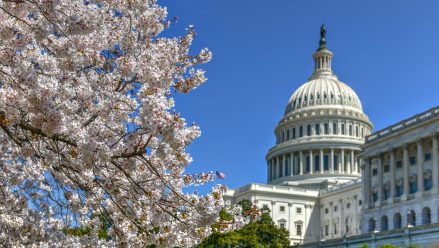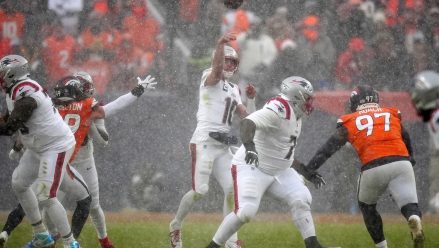The Illinois legislature’s sneak play late Saturday night may just come back to haunt it. While sports betting operators seem to have absorbed last year’s massive tax hike, analysts say this latest attempt to squeeze more tax dollars from the gambling sector may well have the opposite effect.
The inserted language into its FY 2026 budget includes a first-of-its-kind per-wager tax. Operators would pay 25 cents per wager made on the first 20 million bets placed during the year and 50 cents per wager above the 20 million threshold. That’s 25 or 50 cents whether the bet is $1 or $1,000. Both legislative chambers passed the budget late Saturday night, and Gov. JB Pritzker is expected to sign it. It would go into effect July 1.
“It’s likely to do two things,” Joe Stauff, a senior equity analyst at Susquehanna, told InGame. “It could drive more of the VIP business out of the market into black markets, and it could reduce the potential growth of [sports betting in] the state largely because the sportsbooks now cannot reinvest as much in both promotional and marketing. That would lower engagement by definition versus a comparable state that doesn’t have these restrictions.”
Stauff isn’t the only financial analyst expecting a kind of reversal.
“Similar to last year’s IL tax increase, we wonder if the change emboldens illegal market operators, as players may move away from regulated gaming with less attractive/higher tax offerings,” Truist analyst Barry Jonas wrote in a note Sunday.
Bettor surcharge could resurface, this time in Illinois
Financial analysts also suggest that adding another tax in Illinois will degrade the current product and could invite back the idea of a “bettor surcharge,” first floated by DraftKings last August. DraftKings proposed what amounted to a winners’ tax for those unlucky enough to wager in states with tax rates over 20%. The backlash late last summer and fall was swift and negative. In early September, competitor Flutter said during its earnings call that it would not do the same. DraftKings backed down.
But with a proposal that would raise the effective tax in Illinois to or above New York’s 51% tax rate, operators will have to find a way to mitigate the expense if — or more likely, when — Pritzker signs the bill. The increase would be the second time in 12 months that the cost of doing business in Illinois has skyrocketed.
On July 1, 2024, the traditional wagering tax rate more than doubled for the state’s biggest operators — DraftKings and FanDuel — when a progressive tax was implemented. When operators launched in Illinois in June 2020, all paid a flat 15% tax on gross gaming revenue. They now pay between 20-40%, depending how prolific they are.
The new proposed tax on wagers would be in addition to that rate and, in the span of just over a year, Illinois will have gone from being one of the most affordable states in which to do business to one of the most expensive.
“Another offset the operators could return to is a surcharge on bets placed in the state,” Jefferies equity analyst David Katz wrote Monday. “Recall, this was attempted unilaterally by DKNG in IL in response to the initial tax hike in 2024, though the company reversed course against pushback.”
Katz went on to write, though, that his team believes the surcharge idea “would only be pursued in conjunction among all operators.” Jonas also wrote that he thinks the industry will revisit the idea of a surcharge.
Hurtling toward prediction markets?
Sending bettors offshore is — or should be — the most concerning side effect of this new legislation. State lawmakers and regulators across the U.S. place a premium on responsible gambling education, problem gambling programs, and other consumer protections — not to mention tax revenue. Offshore sportsbooks offer none of those — or any recourse if a bettor isn’t paid.
Another possibility, some analysts say, is that major operators may speed up their timelines for entering prediction markets. Jonas wrote that “prediction markets, while controversial, offer operators (for now) the chance to sidestep taxation entirely.”
Since Kalshi began offering election betting last November and took bets on the Super Bowl in February, the prediction platform has been in the news. Traditional sportsbooks and states with legal gambling are crying foul. The platforms pay federal vs. state tax and there are no responsible gambling guardrails around the sector.
Kalshi’s revenue would represent less than 1% of the total U.S. sports betting market. But the exchange plays by a different set of rules — and DraftKings and FanDuel parent company Flutter have indicated an interest in betting exchanges. DraftKings in March registered the name “DraftKings Predict” with the National Futures Association, but withdrew the application in April. Flutter has a similar product in Europe, BetFair, and executives from both companies mentioned prediction markets in earnings calls this year.
But will they move forward? Probably not in any state where either company already holds a legal sports betting license, including Illinois.
“It’s very unlikely considering that the user interface between both products is night and day,” Stauff said. “There is nothing close to a comparable product offering on the exchange versus the sportsbook. As a result of that, it is very unlikely that would occur.
“The second piece of that sentence is that sportsbooks are very unlikely to use the exchanges in legal OSB states because the last thing they want to do is jeopardize their state licenses.”
IL market could shift, shrink
The change in the cost of doing business in Illinois would be staggering. According to an InGame review, had the new tax been in place in FY 2025, FanDuel would have paid an additional $59.8 million in taxes and DraftKings would have paid an additional $52.5 million. They are the only two operators that take more than 20 million bets per year. All other operators would have paid an additional $3.2 million or less.
An increased tax burden will trickle down. The Sports Betting Alliance (SBA) wrote to InGame Sunday that “customers understand that they will be the ones to bear the cost of this new tax.”
Comprised of BetMGM, DraftKings, Fanatics Sportsbook, and FanDuel, the SBA went on to say that many customers bet $1 at a time. In that scenario, 25-50% of the single dollar would go directly to the new tax. That’s on top of the state tax that operators pay on gross gaming revenue and the one-quarter of one percent federal excise tax on handle.
Operators may choose to limit offerings, increase the minimum bet, increase odds, or float the surcharge idea again. Any of those options would be bad for consumers.
Jonas pondered if this latest proposed tax increase would eventually shrink or shift the market in Illinois. “Similar to last year’s IL tax increase, we wonder if the change emboldens illegal market operators as players may move away from regulated gaming with less attractive/higher tax offerings,” he wrote.
There may also be an opportunity, Jonas wrote, for smaller legal operators to cut into DraftKings’ and FanDuel’s market share. The less prolific a sportsbook, the lower the tax.
For example, Circa Sportsbook is paying the lowest overall tax rate of 20%, compared to 40% for DraftKings and FanDuel. In the proposed scenario, Circa would be paying 25 cents per bet while DraftKings and FanDuel would be paying 50 cents for some wagers. It would seem to follow that a legal operator with a lower tax burden would also offer a more competitive product.
“Similar to last year’s IL tax increase, we’ll again look to see if onshore challenger operators use the tax increase as an opportunity to gain share from FanDuel & DKNG given the graduated tax system,” Jonas wrote. “While FanDuel and DKNG have worked to mitigate last year’s tax increase, we haven’t heard (operator commentary) or seen (state data) any meaningful shifts (market share, pricing, etc.) since enactment.”
Just the beginning?
The proposed increase in Illinois could be just the beginning, though analysts are split on whether the new wager tax will open the floodgates in other U.S. jurisdictions.
Jonas posits that “other states could look to copy IL, much how IL essentially has copied NY/NH. In our 2025 Year Ahead, we noted expected volatility in legislative sessions around higher OSB tax rates; and up until now had been focused on NJ, LA, and NC’s tax increase discussions — with expectations of more limited impacts to operators.”
Katz wrote, “While this has been a bearish Street narrative, we do not expect this to occur given specific states’ history of tax policy. It is true that states facing budget shortfalls could turn to tax increases, although longer term and recent history suggests this is not how most states behave.”
Sports betting operators have been navigating proposed tax increases across the U.S. this year. Maryland lawmakers raised the sports betting tax there from 15% to 20% in May. Colorado lawmakers voted to sunset promotional deductions. A Louisiana bill that would increase that state’s rate from 15% to 21.5% is out of the House, and Monday, the Senate Committee on Revenue and Fiscal Affairs gave it a favorable recommendation.
Besides those bills, Ohio Gov. Mike DeWine proposed a second doubling of his state’s wagering tax early in the year, but the legislature shot it down. In May, an Ohio senator dropped a bill that would add a 2% handle tax in the state. That bill was referred to the Senate Select Committee on Gaming on May 28. And lawmakers in New Jersey and North Carolina tinkered with the idea, but so far there has been no meaningful action.
What will operators do?
Once Pritzker signs the Illinois budget, wagering operators will have to scramble to figure out how to manage the tax. An SBA spokesperson called the tax crippling and said it would have a “devastating impact … on the legal market.”
Social media was alight over the issue during the weekend, with some calling lawmakers corrupt and others questioning why consumers choosing to support the legal market will be punished (again).
Monday morning, Wall Street reacted accordingly, pushing DraftKings stock down 8.5% before it closed the day down 6%. The effect on FanDuel parent Flutter wasn’t quite so profound; the stock was down 3.7% in early trading but settled at a 2.7% decrease. The changes in valuation, particularly for DraftKings, could affect other business plans if the stock does not recover.
Operators now have one month to figure out how to change their business models to accommodate the new proposal.
The SBA said in a statement that “This is not the end of this conversation. We will continue to fight this discriminatory tax alongside our customers — both right now in Illinois and in any state that considers these harmful tax changes in the future.”
The question is what that will look like for Illinois bettors.






